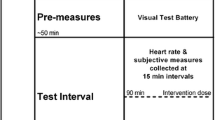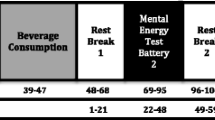Abstract
Rationale
Many studies have found that caffeine consumed after overnight caffeine abstinence improves cognitive performance and mood. Much less is known, however, about the effects of caffeine after shorter periods of caffeine abstinence.
Objectives
The aim of this study was to measure the effects on psychomotor and cognitive performance, mood, hand steadiness, blood pressure and heart rate of caffeine administration after periods of 4, 6, and 8 h of caffeine abstinence.
Methods
Participants (n=49, 27 female) were moderate to moderate-high caffeine consumers (mean daily intake 370 mg/day). Following overnight caffeine abstinence, a ‘pre-dose’ of caffeine (1.2 mg/kg) was administered at 9 a.m., 11 a.m. or 1 p.m. The participants started a baseline battery of measurements at 4 p.m. before receiving caffeine (1.2 mg/kg) or placebo at 5 p.m. They then performed the battery of tests again, starting at 5:30 p.m. This was a double-blind, placebo-controlled, randomised study.
Results
Performance and mood measurements confirmed a psychostimulant action of caffeine (versus placebo), but only after 8 h of caffeine abstinence. Caffeine also increased blood pressure after 8-h abstinence, whereas hand steadiness was decreased and perception of task demand was increased by caffeine after 4 h, but not after 6- and 8-h abstinence.
Conclusions
A second cup-of-coffee equivalent dose of caffeine only reliably affected cognitive performance and mood after an 8-h interval between doses, but not after shorter intervals (when caffeine had some adverse effects). These results show that, apart from caffeine consumption soon after waking, the daily pattern of caffeine intake of many typical caffeine consumers is not well explained by the short-term psychostimulant effects of caffeine.

Similar content being viewed by others
References
Arnold RW, Springer DT, Engel WK, Helveston EM (1993) The effect of wrist rest, caffeine, and oral timolol on the hand steadiness of ophthalmologists. Ann Ophthalmol 25:250–253
Baddeley AD (1999) Essentials of human memory. Psychology Press, Hove
Bovim G, Naess P, Helle J, Sand T (1995) Caffeine influence on the motor steadiness battery in neuropsychological tests. J Clin Exp Neuropsychol 17:472–476
Broadbent DE, Broadbent HP, Jones JJ (1989) Time of day as an instrument for the analysis of attention. Eur J Cogn Psychol 1:69–94
Bruce M, Scott N, Shine P, Lader M (1991) Caffeine withdrawal: a contrast of withdrawal symptoms in normal subjects who have abstained from caffeine for 24 hours and for 7 days. J Psychopharmacol 5:129–143
Eriksen BA, Eriksen CW (1974) Effects of noise letters upon identification of target in a non-search task. Percept Psychophys 16:143–149
Flaten MA, Blumenthal TD (1999) Caffeine-associated stimuli elicit conditioned responses: an experimental model of the placebo effect. Psychopharmacology 145:105–112
Heatherley SV, Hayward RC, Twyford HE, Moss EJ, Rogers PJ (2002) Psychostimulant and other effects of caffeine as a function of the duration of short-term caffeine abstinence. Behav Pharmacol 13:486
James JE (1990) The influence of user status and anxious disposition on the hypertensive effects of caffeine. Int J Psychophysiol 10:171–179
James JE (1994) Does caffeine enhance or merely restore degraded performance? Neuropsychobiology 30:124–125
James JE (1997) Understanding caffeine: a biobehavioral analysis. Sage, Thousand Oaks, CA
James JE (1998) Acute and chronic effects of caffeine on performance, mood, and sleep. Neuropsychobiology 38:32–41
Leark RA, Dupuy T, Greenberg L, Corman C, Kindschi C (1996) Test of variables of attention: professional manual. Universal Attention Disorders, Los Alamitos, CA
Lieberman HR, Wurtman RJ, Emde GG, Roberts C, Coviella ILG (1987) The effects of low doses of caffeine on human performance and mood. Psychopharmacology 92:308–312
Miller LS, Lombardo TW, Fowler SC (1998) Caffeine, but not time of day, increases whole-arm physiological tremor in non-smoking moderate users. Clin Exp Pharmacol Physiol 25:131–133
Richardson NJ, Rogers PJ, Elliman NA, O’Dell RJ (1995) Mood and performance effects of caffeine in relation to acute and chronic caffeine deprivation. Pharmacol Biochem Behav 52:313–320
Robelin M, Rogers PJ (1998) Mood and psychomotor performance effects of the first, but not of subsequent, cup-of-coffee equivalent doses of caffeine consumed after overnight caffeine abstinence. Behav Pharmacol 9:611–618
Rogers PJ, Dernoncourt C (1998) Regular caffeine consumption: a balance of adverse and beneficial effects for mood and psychomotor performance. Pharmacol Biochem Behav 59:1039–1045
Rogers PJ, Richardson NJ (1994) Why do we like drinks that contain caffeine? Trends Food Sci Technol 4:108–111
Rogers PJ, Richardson NJ, Elliman, NA (1995) Overnight caffeine abstinence and negative reinforcement of preference for caffeine-containing drinks. Psychopharmacology 120:457–462
Rogers PJ, Stephens S, Day JEL (1998) Contrasting performance effects of caffeine after overnight and chronic caffeine withdrawal. J Psychopharmacol 12:A13
Rogers PJ, Martin J, Smith C, Heatherley SV, Smit HJ (2003) Absence of reinforcing, mood and psychomotor performance effects of caffeine in habitual non-consumers of caffeine. Psychopharmacology 167:54–62
Rozin P, Riff D, Mark M, Schull J (1984) Conditioned opponent responses in human tolerance to caffeine. Bull Psychon Soc 22:117–120
Smit HJ, Rogers PJ (2000) Effects of low doses of caffeine on cognitive performance, mood and thirst in low and higher caffeine consumers. Psychopharmacology 152:167–173
Smit HJ, Rogers PJ (2002a) Effects of caffeine on mood. Pharmacopsychoecologia 15:231–257
Smit HJ, Rogers PJ (2002b) Effects of ‘energy’ drinks on mood and mental performance: critical methodology. Food Qual Prefer 13:317–326
Smith AP, Maben A, Brockman P (1994) Effects of evening meals and caffeine on cognitive performance, mood and cardiovascular functioning. Appetite 22:57–65
Snel J, Lorist MM (1998) Nicotine, caffeine and social drinking: behavior and brain function. Harwood, Amsterdam, Netherlands
Warburton DM (1995) Effects of caffeine on cognition and mood without caffeine abstinence. Psychopharmacology 119:66–70
Warburton DM, Bersellini E (2001) An evaluation of a caffeinated taurine drink on mood, memory and information processing in healthy volunteers without caffeine abstinence. Psychopharmacology 158:322–328
Yeomans MR, Spetch H, Rogers PJ (1998) Conditioned flavour preference negatively reinforced by caffeine in human volunteers. Psychopharmacology 137:401–409
Yeomans MR, Ripley T, Davies LH, Rusted JM, Rogers PJ (2002) Effects of caffeine on performance and mood depend on the level of caffeine abstinence. Psychopharmacology 164:241–249
Acknowledgements
This research was supported by a grant from the European Union Fifth Framework Programme (grant no. QLK1-2000-00069). The views expressed in this paper are the sole responsibility of the authors and do not necessarily reflect the views of the European Commission or its services or their future policy in this area.
Author information
Authors and Affiliations
Corresponding author
Additional information
*A summary of some of the results of this study was presented as a poster at a joint meeting of the British Association for Psychopharmacology and European Behavioural Pharmacology Society, held at the University of Sussex, Brighton, UK, in September 2002 (Heatherley et al. 2002)
Rights and permissions
About this article
Cite this article
Heatherley, S.V., Hayward, R.C., Seers, H.E. et al. Cognitive and psychomotor performance, mood, and pressor effects of caffeine after 4, 6 and 8 h caffeine abstinence. Psychopharmacology 178, 461–470 (2005). https://doi.org/10.1007/s00213-005-2159-9
Received:
Accepted:
Published:
Issue Date:
DOI: https://doi.org/10.1007/s00213-005-2159-9




